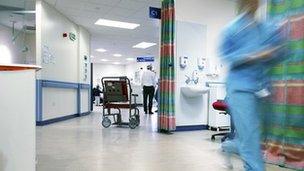Doctors to ballot for industrial action over pensions in May
- Published

Patients requiring emergency care would still receive treatment, the BMA says
Doctors will vote on industrial action in May, if talks over planned changes to their pensions do not resume, the British Medical Association has said.
It has ruled out full strikes over government plans to impose increased contributions and delayed retirement.
But the group says its action could involve a day where staff refuse to perform "non-urgent" tasks that "could safely be postponed".
Ministers say the changes are necessary to make pensions affordable.
Under plans to replace the final salary pension with a career average scheme, the retirement age for doctors in England and Wales would rise to 68 and contributions could reach 14.5% for the highest earners by 2014.
And the association (BMA) says the government is refusing to engage "even to try to find a fairer way".
If it goes ahead, the ballot will be the first among doctors since 1975.
Urgent cases
BMA council chairman Dr Hamish Meldrum said: "There is still time for the government to rethink its plans but, if it does not, we have made a firm commitment that patient safety will be the over-riding priority.
"If we do go ahead, anyone whose condition required urgent or emergency care or investigation that day would be treated."
A series of actions is being planned but the impact on patients of the day of action would be reviewed before a decision to proceed with further action was made.
A pensions deal reached in 2008 gave doctors a retirement age of 65, while those under the previous 1995 scheme can retire at 60.
The BMA represents doctors across all branches of medicine. Any action would be likely to involve the postponement of routine operations and non-urgent outpatient appointments in hospitals.
'Taxpayer cost'
GP practices would remain open and staffed so they could see patients in need of urgent attention, but routine, non-urgent appointments would not be available.
The BMA's Scotland and Northern Ireland branches have previously called on the devolved administrations to consider alternative pension proposals, though they are expected to follow the same plans.
UK Health Secretary Andrew Lansley said last month the new proposals would ensure doctors still received pensions "among the best available".
"The biggest part of the cost of their pension is paid by the taxpayer - for every £1 that doctors pay into their pensions, they will get between £3 and £6 back," he said.
"It is fair that higher earners pay greater contributions relative to those on lower and middle incomes."
The ballot is scheduled to open on May 14 and close on May 29.
- Published8 December 2011
- Published9 February 2012
- Published10 May 2012
- Published10 March 2011